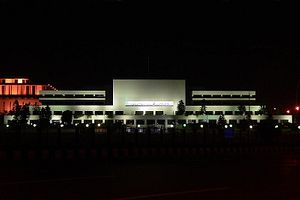On Monday, Mir Muhammad Sadiq Sanjrani, an independent senator in Pakistan’s upper house of the parliament, was elected chairman of Senate. Sanjrani is the eighth Senate chairman and the first chairman elected from the country’s restive Balochistan province.
Sanjrani who was supported by an alliance of opposition parties, including the Pakistan People’s Party (PPP) and the Pakistan Tehreek-e-Insaf (PTI), was not expected to win the chairmanship, as the ruling party holds a majority of seats in the Senate. While Sanjrani’s elevation to one of the country’s highest constitutional positions is being termed a victory of democracy by opposition parties, the result only confirms that anti-democratic forces in Pakistan have strengthened their position further.
If there were any concerted efforts to weaken the ruling party’s ability to govern and undermine its election campaign as the country heads toward the next general election, the result of the Senate election should send an alarming message to forces working for the restoration of true democratic rule in the country. The tragedy in this regard continues to lie with opportunist political groups, whose greed for power has only helped those forces and interests that are constantly working to divide the country’s political elite to undermine constitutionalism and the rule of law.
Following the recent Senate election, the ruling party, which for some time has been under tremendous pressure from various state institutions for its anti-military and anti-judiciary stance, has accused anti-democratic forces in Pakistan of not wanting the strengthening of true democracy in Pakistan. Clearly, a number of senators from the ruling party voted against their own political organization behind closed doors to ensure that Sanjrani won the election.
This trend points toward another worrying trend, where desertions in the favor of forces that do not prefer democratic supremacy are likely to expedite in the coming weeks. With the next general election only a few months away, the Senate election’s result will surely send a message to opportunistic political groups, confirming that their chances of joining the next government may shrink if they continued to support the ruling party.
From here onward, a bitter and fiery contest is likely to emerge among political groups in Pakistan. The main objective of all political groups is now going to be focused on winning the next general election regardless of the costs. All political groups, including the ruling party, will surely begin efforts to work out all sorts of political alliances.
This is where the relevance of religious groups and other hardliners gains strength. In the past, major political groups have made alliances with radical Islamist groups for political and electoral gains. However, after the passing of the National Action Plan (NAP), a 20-point action plan to tackle militancy in the country, a consensus was developed among political groups to undermine the role of religious hardliners in electoral politics. While democratic forces apparently appear to be losing the race to govern the country, interventions of non-democratic forces in Pakistan’s political affairs have given political groups that stand on the losing end no other option, but to appease to radical groups to amass their political support.
The emerging chaotic political environment in the country doesn’t bode well for the overall stability of Pakistan. Apparently, forces working against the democratization of the country are not willing to change their longstanding policy of meddling in domestic political affairs. One can argue that the current ruling party is being isolated politically for its efforts to take back control of the country’s security and foreign affairs.
A firm determination on the part of the military establishment to prevent civilian leadership from gaining effective decision-making power in security and foreign affairs has limited the ruling party’s chances to govern. The unexpected result of the Senate election demonstrates that the military establishment has greatly increased its clout when it comes to encouraging undemocratic political alliance building and using institutional mechanisms to undermine any emerging challenge from the civilian side.
While a number of opposition political parties may have worked with non-democratic forces to ensure that the ruling party’s candidate lost the election, the script is likely to play out the same way when opposition parties sit at the helm of affairs in the future. Sadly, Pakistan’s democratic future will continue to face challenges unless pro-democracy political forces unite.

































